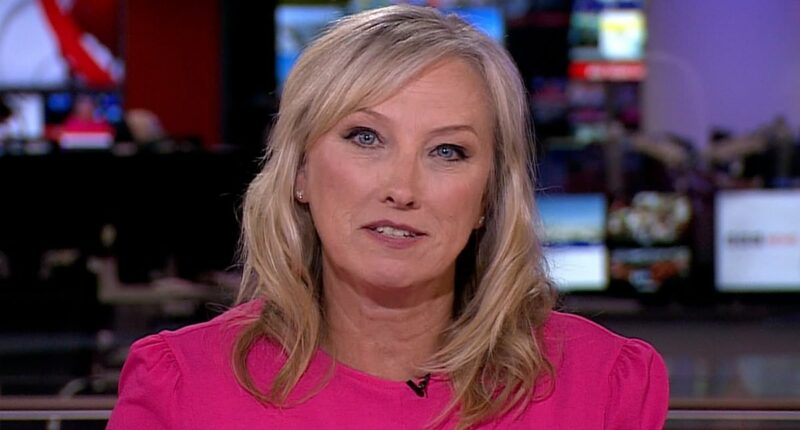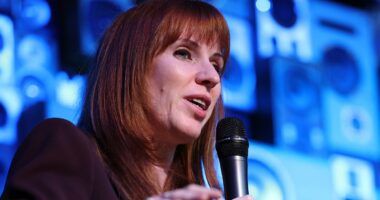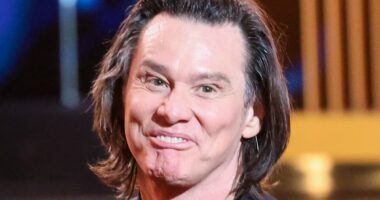Share this @internewscast.com
BBC employees have shown their support for seasoned newsreader Martine Croxall after she made an impromptu correction from ‘pregnant people’ to ‘women’ during a live broadcast.
The 56-year-old anchor was presenting a report on Britain’s heatwave when the teleprompter advised her to caution ‘pregnant people’ to be careful.
After initially reading the scripted line, she paused, raised an eyebrow, and corrected it, saying: “Malcolm Mistry, who participated in the research, stated that the elderly, pregnant people—women—and those with pre-existing health conditions should take precautions.”
Her spontaneous adjustment quickly gained traction online, earning her accolades from viewers and notable personalities like JK Rowling, who described her as her “new favorite BBC presenter.”
However, the BBC’s Executive Complaints Unit (ECU) determined that Croxall had violated impartiality guidelines, noting that her facial expression suggested she was conveying a personal stance on a contentious issue.
Out of the complaints received, only 20 were upheld by the ECU, which explained: “As conveying the strong impression of expressing a personal opinion on a contentious topic, even unintentionally, does not meet the BBC’s standards for impartiality expected of its presenters and journalists, the ECU upheld the complaints.”
However many BBC staff are said to have backed Croxall, arguing she simply corrected an ‘obvious mistake’ rather than making a ‘political point’.
A BBC source told the Daily Mail: ‘She’s quite a character – she can be quite sparky, it’s not uncommon for her to do things like that and be playful with her presentation. And she can be quite robust with people on air.
‘But it’s a problem we face in our business when someone puts a bit of their personal energy on screen.

Martine Croxall (pictured as she was made to say ‘pregnant people’) is one of the main presenters of BBC News, having started work for the broadcaster more than 30 years ago, in 1991, and for its news programme in 2001
‘The question is why did she do it – it seems like she is not being transphobic, but rather that she didn’t like the bad writing in the script.
‘There’s a bit of a divide over this. A lot of people were saying it isn’t really fair on Martine, while some say it was a breach of impartiality.’
It comes as the BBC were forced to correct an article they wrote on the issue because it was decided the first was too harsh on Croxall.
The correction note read: ‘This article originally said the ECU found that Martine Croxall’s facial expression as she spoke expressed a ‘controversial view about trans people’ and has been amended to make clear that they instead found that her expression gave the ‘strong impression of expressing a personal view on a controversial matter’.
‘The article also mistakenly quoted the judgement as referring to ‘trans ideology’ and has been amended to correctly refer to ‘trans identity’.’
According to sources who spoke to the Daily Mail at the time, the presenter was visibly ‘shocked and frustrated’ when the autocue first displayed the words ‘pregnant people’.
One senior BBC figure remarked: ‘Most people didn’t need a Supreme Court ruling to tell them what a woman is – but based on what happened to Martine Croxall, it seems someone at the BBC might.’
The same insider insisted that Croxall ‘has the full backing of the BBC because she got it right’, adding: ‘She was stating a fact and correcting a mistake.’
Ms Croxall has supported women on TV before – and behind the scenes also stood up with female colleagues in their fight for equal pay at the corporation.

She posted a picture of herself yesterday morning, smiling into the camera with her colleague Sally Bundock sitting behind the newsdesk as the duo prepared to go live on air

Martine Croxall, arriving at the Central London Employment Tribunal, before the case over pay was settled by the BBC
In April the broadcaster was praised when she challenged a transgender activist who claimed the Supreme Court’s ruling that the definition of a woman is based on biological sex may still need ‘clarification’.
The BBC veteran firmly told ex-Labour MSP candidate Heather Herbert that the landmark ruling made it clear ‘sex is binary and immutable’.
Leicestershire-born Ms Croxall repeatedly challenged Herbert after she called for further ‘clarification’ on single sex spaces, at one point reminding her: ‘The ruling is that woman means biological sex.’
Politicians were quick to condemn the BBC’s response. Conservative Kemi Badenoch, who was then Equalities Minister, said: ‘Whoever reprimanded Martine Croxall has lost the plot. This is the latest in an endless series of complaints that shows the BBC is no longer acting as a public service broadcaster.
‘Licence fee payers want the truth, not force-fed ideological rubbish from a cabal of agenda-driven activists.
‘The director-general should get involved and if he cannot protect his staff then he should go and the board should recruit someone who will impose common sense. Croxall deserves an apology not a rebuke.’
Reform UK leader Nigel Farage also blasted the decision, calling it ‘complete double standards’ and insisting: ‘The newsreader should be applauded, not scolded. Why should people continue to pay the licence fee?’
Former Prime Minister Boris Johnson accused the BBC of ‘grotesque bias’, saying: ‘They have suppressed debate about the trans issue. Anyone who owns a TV is compelled to fund this organisation. Tim Davie must either explain or resign.’
Croxall, who joined the BBC in 1991, has long been known as one of the corporation’s most forthright presenters.
The controversy comes after Croxall and several female colleagues settled a legal case against the BBC over alleged pay inequality, claiming they lost roles after a ‘rigged’ recruitment process.

















